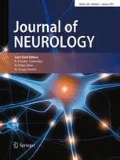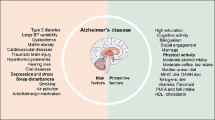Abstract
Mild cognitive impairment (MCI) is a clinical condition with a high risk of progression to dementia. Due to lack of effective disease-modifying therapies for advanced dementia, diagnosis and disease intervention at an early stage, particularly at MCI stage, has been widely accepted as a critical strategy in disease management that could potentially affect long-term outcome. However, there is currently no consensus on guidelines for routine screening of MCI, resulting in a considerable number of patients with undiagnosed MCI from community. In addition, the use of different screening guidelines leads to difficulties in comparing different studies. A variety of screening tools have been utilized; however, the sensitivity and specificity vary greatly among these tools. By summarizing the sensitivity, specificity and time efficiency for common MCI screening tools, which are key factors to be taken into consideration when making selections and combinations of screening tools, this review suggests the use of a combination of two self-administered highly sensitive tools, p-AD8 + IQCODE (informant questionnaire on cognitive decline in the elderly individuals) in initial screening, as well as a combination of two highly specific widely covered tools, DemTect + MoCA (Montreal cognitive assessment) or memory and executive screening (MES) + MoCA in secondary screening. In addition, this review also proposes a screening flowchart for MCI, aiming to build a sensitive and time efficient way for recruiting subjects for subsequent investigation and disease differentiation.



Similar content being viewed by others
References
Cummings J et al (2016) Drug development in Alzheimer's disease: the path to 2025. Alzheimers Res Ther 8:39
Kinsella GJ et al (2009) Early intervention for mild cognitive impairment: a randomised controlled trial. J Neurol Neurosurg Psychiatry 80(7):730–736
Albert MS et al (2011) The diagnosis of mild cognitive impairment due to Alzheimer's disease: recommendations from the National Institute on Aging-Alzheimer's Association workgroups on diagnostic guidelines for Alzheimer's disease. Alzheimers Dement 7(3):270–279
Elman JA et al (2018) Underdiagnosis of mild cognitive impairment: a consequence of ignoring practice effects. Alzheimers Dement (Amst) 10:372–381
Gauthier S et al (2006) Mild cognitive impairment. Lancet 367(9518):1262–1270
Gillis C et al (2019) The incidence of mild cognitive impairment: a systematic review and data synthesis. Alzheimers Dement (Amst) 11:248–256
Winblad B et al (2004) Mild cognitive impairment-beyond controversies, towards a consensus: report of the International Working Group on Mild Cognitive Impairment. J Intern Med 256(3):240–246
Dubois B et al (2007) Research criteria for the diagnosis of Alzheimer's disease: revising the NINCDS-ADRDA criteria. Lancet Neurol 6(8):734–746
Petersen RC et al (2014) Mild cognitive impairment: a concept in evolution. J Intern Med 275(3):214–228
Petersen RC (2004) Mild cognitive impairment as a diagnostic entity. J Intern Med 256(3):183–194
Busse A et al (2006) Mild cognitive impairment: long-term course of four clinical subtypes. Neurology 67(12):2176–2185
Canevelli M et al (2016) Spontaneous reversion of mild cognitive impairment to normal cognition: a systematic review of literature and meta-analysis. J Am Med Dir Assoc 17(10):943–948
Koch T, Iliffe S (2010) Rapid appraisal of barriers to the diagnosis and management of patients with dementia in primary care: a systematic review. BMC Fam Pract 11:52
Fischer P et al (2007) Conversion from subtypes of mild cognitive impairment to Alzheimer dementia. Neurology 68(4):288–291
Wallin A et al (2016) The Gothenburg MCI study: design and distribution of Alzheimer's disease and subcortical vascular disease diagnoses from baseline to 6-year follow-up. J Cereb Blood Flow Metab 36(1):114–131
Dubois B et al (2016) Timely diagnosis for Alzheimer's disease: a literature review on benefits and challenges. J Alzheimers Dis 49(3):617–631
Li F, Jia XF, Jia J (2012) The informant questionnaire on cognitive decline in the elderly individuals in screening mild cognitive impairment with or without functional impairment. J Geriatr Psychiatry Neurol 25(4):227–232
Abd Razak MA et al (2019) Validity of screening tools for dementia and mild cognitive impairment among the elderly in primary health care: a systematic review. Public Health 169:84–92
Harrison JK et al (2016) Informant questionnaire on cognitive decline in the elderly (IQCODE) for the early diagnosis of dementia across a variety of healthcare settings. Cochrane Database Syst Rev 11:CD011333
Galvin JE et al (2007) Patient's rating of cognitive ability: using the AD8, a brief informant interview, as a self-rating tool to detect dementia. Arch Neurol 64(5):725–730
Chen HH et al (2018) The diagnostic accuracy of the Ascertain Dementia 8 questionnaire for detecting cognitive impairment in primary care in the community, clinics and hospitals: a systematic review and meta-analysis. Fam Pract 35(3):239–246
Carpenter CR et al (2011) The six-item screener and AD8 for the detection of cognitive impairment in geriatric emergency department patients. Ann Emerg Med 57(6):653–661
Chin R et al (2013) Utility of the AD8 as a self-rating tool for cognitive impairment in an Asian population. Am J Alzheimers Dis Other Dementias 28(3):284–288
Tierney MC et al (2014) Feasibility and validity of the self-administered computerized assessment of mild cognitive impairment with older primary care patients. Alzheimer Dis Assoc Disord 28(4):311–319
Aslam RW et al (2018) A systematic review of the diagnostic accuracy of automated tests for cognitive impairment. Int J Geriatr Psychiatry 33(4):561–575
Judge D et al (2019) Physician practice patterns associated with diagnostic evaluation of patients with suspected mild cognitive impairment and Alzheimer's Disease. Int J Alzheimers Dis 2019:4942562
Ozer S et al (2016) A systematic review of the diagnostic test accuracy of brief cognitive tests to detect amnestic mild cognitive impairment. Int J Geriatr Psychiatry 31(11):1139–1150
Tsoi KKF et al (2017) Recall tests are effective to detect mild cognitive impairment: a systematic review and meta-analysis of 108 diagnostic studies. Am Med Dir Assoc 18(9):807e17–807e29
Pinto TCC et al (2019) Is the Montreal cognitive assessment (MoCA) screening superior to the mini-mental state examination (MMSE) in the detection of mild cognitive impairment (MCI) and Alzheimer's disease (AD) in the elderly? Int Psychogeriatr 31(4):491–504
Cordell CB et al (2013) Alzheimer's Association recommendations for operationalizing the detection of cognitive impairment during the medicare annual wellness visit in a primary care setting. Alzheimers Dementias 9(2):141–150
Folstein MF, Folstein SE, McHugh PR (1975) Mini-mental state. A practical method for grading the cognitive state of patients for the clinician. J Psychiatr Res 12(3):189–198
Sokolowska N et al (2018) Comparison of the effectiveness of the Montreal cognitive assessment 7.2 and the mini-mental state examination in the detection of mild neurocognitive disorder in people over 60 years of age. Preliminary study. Psychiatr Pol 52(5):843–857
Saji M et al (2019) Cognitive assessment using the revised Hasegawa's dementia scale to determine the mid-term outcomes following transcatheter aortic valve replacement. J Cardiol
Lischka AR et al (2012) A systematic review of screening tools for predicting the development of dementia. Can J Aging 31(3):295–311
Kalbe E et al (2004) DemTect: a new, sensitive cognitive screening test to support the diagnosis of mild cognitive impairment and early dementia. Int J Geriatr Psychiatry 19(2):136–143
Welsh K et al (1991) Detection of abnormal memory decline in mild cases of Alzheimer's disease using CERAD neuropsychological measures. Arch Neurol 48(3):278–281
Junkkila J et al (2012) Applicability of the CANTAB-PAL computerized memory test in identifying amnestic mild cognitive impairment and Alzheimer's disease. Dementias Geriatr Cogn Disord 34(2):83–89
Guo QH et al (2012) Memory and Executive Screening (MES): a brief cognitive test for detecting mild cognitive impairment. BMC Neurol 12:119
Delgado Derio C et al (2013) Memory, fluency, and orientation: a 5-min screening test for cognitive decline. Neurologia 28(7):400–407
Papageorgiou SG, Economou A, Routsis C (2014) The 5 objects test: a novel, minimal-language, memory screening test. J Neurol 261(2):422–431
Wellens NI et al (2013) Convergent validity of the cognitive performance scale of the interRAI acute care and the mini-mental state examination. Am J Geriatr Psychiatry 21(7):636–645
Douglas A et al (2012) Use of the cognitive performance test for identifying deficits in hospitalized older adults. Rehabil Res Pract 2012:638480
Tarnanas I et al (2013) Ecological validity of virtual reality daily living activities screening for early dementia: longitudinal study. JMIR Serious Games 1(1):e1
Zygouris S et al (2015) Can a virtual reality cognitive training application fulfill a dual role? Using the virtual supermarket cognitive training application as a screening tool for mild cognitive impairment. J Alzheimers Dis 44(4):1333–1347
Petersen RC et al (2018) Practice guideline update summary: mild cognitive impairment: report of the guideline development, dissemination, and implementation subcommittee of the American Academy of Neurology. Neurology 90(3):126–135
Carson N, Leach L, Murphy KJ (2018) A re-examination of Montreal cognitive assessment (MoCA) cutoff scores. Int J Geriatr Psychiatry 33(2):379–388
Ehreke L et al (2010) Is the clock drawing test a screening tool for the diagnosis of mild cognitive impairment? A systematic review. Int Psychogeriatr 22(1):56–63
Author information
Authors and Affiliations
Corresponding author
Ethics declarations
Conflicts of interest
The authors declare that they have no conflicts of interest.
Ethical standards
This manuscript does not contain clinical studies or patient data.
Rights and permissions
About this article
Cite this article
Zhuang, L., Yang, Y. & Gao, J. Cognitive assessment tools for mild cognitive impairment screening. J Neurol 268, 1615–1622 (2021). https://doi.org/10.1007/s00415-019-09506-7
Received:
Revised:
Accepted:
Published:
Issue Date:
DOI: https://doi.org/10.1007/s00415-019-09506-7




